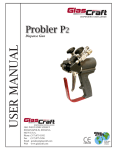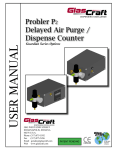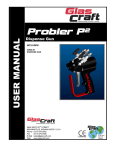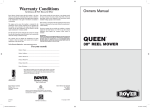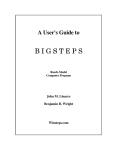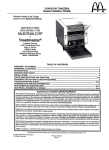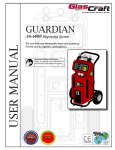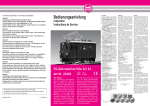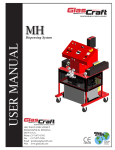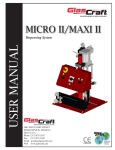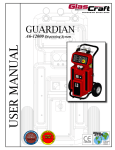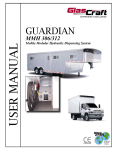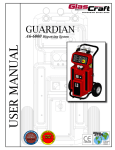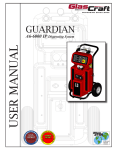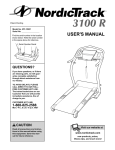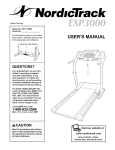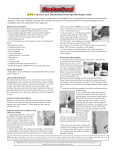Download Glas-Craft Super Maxi User Manual
Transcript
Super Maxi Dispensing System USER MANUAL ble r Pro An ISO 9001 Approved Company 5845 WEST 82nd STREET, SUITE 102 INDIANAPOLIS, INDIANA 46278 U.S.A. Phone Fax E-Mail Web (317) 875-5592 (317) 875-5456 [email protected] www.glascraft.com Specialized Dispensing Equipment and Technology CE CERTIFIED CONTENTS Introduction ABOUT THIS MANUAL RELATED MANUALS Operation 1 1 Parts & Illustrations SUPER MAXI SYSTEM LIST OPTIONS SERVICE KITS SYSTEM SPECIFICATIONS 23600-00 SUPER MAXI SYSTEM ASSEMBLY 23600-00 SUPER MAXI SYSTEM ASSEMBLY 23600-00 SUPER MAXI SYSTEM ASSEMBLY 23620-00 SUPER MAXI CONTROL BOX ASSEMBLY 23620-00 SUPER MAXI CONTROL BOX DETAILS SUPER MAXI 220V, SINGLE PHASE SCHEMATIC 23625-XX PROPORTIONING UNIT ASSEMBLY 23625-XX PROPORTIONING DETAILS AM-600-00 AIR MOTOR 21835-00 FLUID SECTION ASSEMBLY 22075-00 DUAL HEAT EXCHANGER ASSEMBLY 22075-00 DUAL HEAT EXCHANGER ASSEMBLY 20005-48 HOSE ASSEMBLY 17254-01 PROBLER SPRAY GUN 2 2 2 3 4 5 6 7 8 9 10 11 12 13 14 15 16 17 PRE-OPERATION CHECK LIST INITIAL START-UP PROCEDURE FILLING THE SYSTEM OVER PRESSURE SYSTEM PROTECTION OVER PRESSURE PROBLEM CORRECTION CONTROL PANELS PROPORTIONING PUMP AIR MOTOR SYSTEM SHUT- DOWN 22 22 24 24 24 25 25 25 Overhaul Procedure BREAKING DOWN PUMP DISASSEMBLE SUB-ASSEMBLIES CLEANING INSPECTION RE-ASSEMBLE FOR 19875-00 PUMPS 27 28 Limited Warranty Policy 30 Safety SAFE HANDLING AND USE OF SPRAY EQUIPMENT 18 31 Installation ASSEMBLY INSTRUCTIONS AIR SUPPLY CONNECTION ELECTRICAL CONNECTION Notes 21 21 21 If You Have An Equipment Problem 32 INTRODUCTION This manual provides information for the assembly, operation, maintenance and service of this Glas-Craft product as used in a typical configuration. While it lists standard specifications and procedures, some deviations may be found. About This Manual Before operating, maintaining or servicing any Glas-Craft system, read and understand all of the technical and safety literature provided with Glas-Craft products. If you do not have the manuals and safety literature for your Glas-Craft system, contact your Glas-Craft distributor or Glas-Craft, Inc. In order to provide our users with the most up-to-date technology possible, we are constantly seeking to improve products. If technological change occurs after a product is on the market, we will implement that technology in future production and, if practical, make it available to current users as a retrofit, up-date or supplement. If you find some discrepancy between your unit and the available documentation, contact your GlasCraft distributor to resolve the difference. Glas-Craft, Inc. reserves the right to change or modify this product as it deems necessary. In this Glas-Craft technical and safety publication, the following advisories will be provided where appropriate: NOTE Is information about the procedure in progress. CAUTION Careful study and continued use of this manual will provide a better understanding of the equipment and process, resulting in more efficient operation, longer trouble-free service and faster, easier trouble-shooting. Is imperative information about equipment protection. WARNING Is imperative information about personnel safety. Related Manuals The information in this document is intended only to indicate the components and their normal working relationship typical use. Each assembly should be directed by a Glas-Craft distributor or made from the Glas-Craft assembly instructions provided. For detailed component installation, operation and maintenance, refer to the following component manuals: 17254 1 COMPONENT MANUAL NUMBER Probler Gun GC-1023 PARTS & ILLUSTRATIONS Includes 23600-00 Super Maxi FOAM SYSTEM * 6" AIR MOTOR, 1 PHASE, 200/240 VAC, 50/60 HZ., 60 AMP 17254-01 PROBLER GUN ASSEMBLY * W/ ROUND SPRAY MIXING CHAMBER 20005-48 23625-XX 22075-00 59934-04 17661-03 21845-00 17195-00 HEATED HOSE ASSEMBLY, 50 FT. PROPORTIONING UNIT ASSEMBLY DUAL HEAT EXCHANGER ASSEMBLY DIOCTYL PHTHALATE, 1 QT. GUN SERVICE KIT PUMP FLUID SECTION SERVICE KIT (TWO SUPPLIED) 18467-01 FLUID FILTER (TWO SUPPLIED) MIXING CHAMBER REMOVAL TOOL USER MANUALS Options 21403-48 HIGH HEAT EXTENSION HOSE ASSY., 50 FT. > maximum Hose length, 210 FT. Service Kits 17661-03 GUN SERVICE KIT 2 SYSTEM SPECIFICATIONS MATERIAL RATIO: 1:1 (FIXED) MATERIAL VISCOSITY: 200-2000 CENTIPOISE (CPS) @ AMBIENT (*system set-up for transfer feed) (lower foot valves spring loaded) OUTPUT: .042 GAL MAX OUTPUT= 2.52 GAL / MIN @ 60 CYCLES / MIN OPERATING TEMPERATURES: 32° F (0°C) - 190° F (88° C) CONTINUALLY VARIBLE OPERATING PSI: 3200 PSI. MAX (over psi switches set) 2200 PSI. @ 100 PSI. AIR MOTOR PURGING: AUTOMATIC PNEUMATIC, SOLVENT-FREE, CONSTANT ELECTRICAL REQUIREMENTS: 208 VAC 50 AMPS 50/60 HZ SINGLE PHASE COMPRESSED AIR REQUIREMENTS: SYSTEM (includes 2:1 aro transfer pumps) 1.0 GAL PER MINUTE – 34.4 CFM @ 100 PSI. 1.5 GAL PER MINUTE – 50.6 CFM @ 100 PSI. 2.0 GAL PER MINUTE – 57.4 CFM @ 100 PSI. NOTE: As output is increased, (achieved w/ chamber size on gun or spray tip), pressure drop will be greater. Heater temperature will also drop. HEATERS: 1500 WATT RODS 3000 WATTS PER SIDE 6000 WATTS TOTAL MAXIMUM HOSE LENGTH: OVERALL DIMENSIONS: SHIPPING WEIGHT: 3 23600-00 SUPER MAXI SYSTEM ASSEMBLY 22086-02 Retract Switch Kit 22083-00 Decal (RUN) 23625-00 Pr opor tioning Unit As s y. 22084-00 Decal (RETRACT) 19882-00 Cap 21802-00 21881-00 19890-00 M ounting Clam p As sy. Support Mast 23602-00 Decal (SUPER MAXI) 23620-00 Contr ol Box As sy. Pressure Gauge 7966-17 4342-23 Fitting ElbowFitting 8560-17 Fitting 6782-23 21315-00 22075-00 Dual He at Exchanger As sy. Tee Fitting Fitting 20368-00 Swivel Casters 7733-42 Nut 7734-10 Lock Washer 7486-04 Flat W asher 22086-02 Retract Switch Kit 18291-00 Floor Mount Mast 10080-05 Barb Hose Fitting 22087-00 Retract Switch Bracket 17826-00 Name Plate 14638-04 Blind Rivot 21660-00 2-W ay Control Valve 8560-03 Fitting 7957-32F Machine Screw 4 23600-00 SUPER MAXI SYSTEM ASSEMBLY 21323-00 Flexible Conduit 21809-02 M ate rial Hos e As s y. 21809-01 M ate rial Hos e As s y. 7957-32F Machine Screw 7486-10 Flat W asher 5 23600-00 SUPER MAXI SYSTEM ASSEMBLY 7730-16C Machine Screw 7734-04 Lock W asher 21807-00 CP-126 Right Surround Guard U-Bolt 20188-16C 21470-00 Machine Screw Counter 7734-06 Lock W asher 21653-00 Counter Bracket GUARD OPTION 7734-07 Lock W asher 21807-00 23603-00 Right Surround Guard Counter Bracket 7735-40C 7733-06 Machine Screw Nut 7486-27 7734-03 Flat Washer Lock W asher 21806-00 22101-00 7730-16C Left Surround Guard Limit Switch Machine Screw 21653-00 7734-06 Counter Bracket Lock W asher 20188-16C Machine Screw 7733-04 Lock W asher 21470-00 Counter CP-126 U-Bolt GUARD WITH COUNTER OPTION 7734-07 8301-48C Lock W asher Machine Screw 23603-00 Counter Bracket 7733-06 22101-00 Nut Limit Switch 7734-03 Lock W asher 22512-00 9944-48C 7734-06 Machine Screw Lock W asher COUNTER OPTION 6 Counter Switch Bracket 23620-00 SUPER MAXI CONTROL BOX ASSEMBLY D RS-124 17702-00 Decal (MAIN) Pilot Lamp 22150-00 Pilot Light 21866-00 Coupling Plate 21886-00 Mounting Lamp Block 21887-01 Yellow Color Cap 21862-00 Push Button 21867-03 Inscription Cap 21865-02 22753-00 Contact Block Decal (OVERPRESSURE) (OVERTEMP) 21361-00 Miniature Lamp 23621-00 D Super Maxi Control Box 21866-00 22178-00 On/Off Power Switch 21355-00 Coupling Plate Decal (OVER TEMPERATURE) 21886-00 Body D i s pe n s i ng S ys t e m RS-119 RS-121 Decal (HOSE) Decal (POLY) RS-118 Decal (ISO) 21356-01 Microprocessor Control 21854-00 Push Button 21867-05 Inscription Cap 21887-03 Green Color Cap 21865-01 Contact Block 21361-00 Miniature Lamp 21866-00 21864-00 Coupling Plate 21886-00 RS-122 Mountin Lamp Block Emergency Stop Push Button RS-124 Decal (MAIN) Decal (PRIMARY) 22104-00 Decal 21865-02 Contact Block 21865-01 7486-28 Flat Washer Contact Block 14638-02 Blind Rivot 21823-00 20188-20C Din Rail Machine Screw 21722-00 Detail C Mounting Bracket See Detail 7 C 23620-00 SUPER MAXI CONTROL BOX DETAILS CP-126 U-Bolt 21722-00 19941-00 Mounting Block Bracket Strap W asher 22171-01 On/Off Switch Block 22527-00 W iring Duct Cover 22528-00 7734-07 22174-01 22157-00 21824-16C 50 Amp Relay Machine Screw 22142-00 Cover Terminal Block 22146-02 W iring Duct Lock W asher 7486-27 Flat W asher Control Box Transformer A 7734-03 22158-00 Lock W asher Terminal Block Spacer 7733-06 Nut 22709-02 Contactor 21888-06 Circuit Breaker 21823-00 Din Rail B B 21081-02 22716-01 Hole Plug 22527-00 W iring Duct Cov er RS-141-02 7734-03 5307-01 Lock W asher Conduit Nut Section 22528-00 W iring Duct 7735-16C M achine Screw Swiv ellok Connector A Cord Grip 21839-00 RS-141-01 3-W ire Connector Cord Grip 5307-01 A-A Conduit Nut T -4-161-01 Cable Connector 21830-00 22422-02 High Pressure Switch 7733-06 5 Amp Relay Nut 22423-02 7 Amp RelaySocket 7734-03 Lock W asher 7486-27 Flat W asher 21815-00 22502-00 Receptacle Circular Panel Jack 21334-00 Thermocouple W ire 21888-05 22506-00 Circuit Breaker Terminal 22159-00 Thermo Block Cover 22507-00 Terminal Cover 22527-00 Cord Grip 22528-00 21823-00 W iring Duct Din Rail 22162-00 Conductor Connector 20226-00 Set Screw 8160-12F Set Screw 21164-02 9943-40F Shoulder Screw 10 Amp RelaySocket 7486-03 Flat W asher 7734-04 21848-00 Lock W asher 7733-07 Nut 2 Amp Fuse 21892-01 Decal 21893-01 Socket 22422-01 10 Amp Relay 21894-00 22423-01 Eject Clip 10 Amp Relay Socket Section B-B 22527-00 W iring Duct Cov er 22528-00 W iring Duct 8 21164-00 1/2 Amp Fuse 21889-00 Fuse Holder 21164-02 2 Amp Fuse SUPER MAXI 220V, SINGLE PHASE SCHEMATIC 9 23625-XX PROPORTIONING UNIT ASSEMBLY 6782-04 Tee Fitting 1625-02 Pipe Plug 6782-04 7729-10 Tee Fitting Nut 21613-48C 19861-00 Set Screw Saddle Pump 19858-00 Air Motor Stand-Off Pipe Fitting 10599-40F 19984-00 Set Screw Stand-Off 21614-64F 19859-00 7486-04 8462-16 Pump Mounting Plate Set Screw Flat W asher 8155-40C 7966-17 7486-10 Pipe Fitting Flat W asher Machine Screw 21835-00 1:1 Pum p As s y. 6782-23 7957-32F Tee Fitting Machine Screw 8560-03 Connector Fitting 10009-02 Elbow Fitting 21831-00 Pump Support Stand-Off REVISED 5/03 10 23625-XX SUPER MAXI PROPORTIONING DETAILS 11021-26 Plug 21666-01 Lock-Out Ball Valve A M -600-00 6" Air Motor 8115-07 Pipe Fitting 6782-04 1625-02 Tee Fitting Pipe Plug 21836-00 Inline Poppet Valve 4342-05 Elbow Fitting 8115-07 Nipple Fitting 4342-05 Elbow Fitting 4342-05 Elbow Fitting 9672-06 Pipe Fitting 22516-00 Air Inlet Filter Regulator REVISED 5/03 11 AM-600-00 AIR MOTOR 51379 A02076-06 72400 51225 51275 A02076-06 Relay Valve Assy. 09520 A00724-07 A02503-2 L-VB A02503-01 09534 51096 09511-B 60007 A02503-02 51132-Z 60009 09543-B 51305 60762 5 10 75 -B 33885 72400 L-VB A02503-09 51275 51231-B 60534 60534 60-TSH 60062 60126 09607 51104 60222 BC -26001-S2V5 09542-B 33581 52050-B A01409-10 09607 33 58 2 60127 A01409-11 31132 60222 60328-80 15431 51126 33582 33581 60419-4283 31132 51126 A01409-12 60328-80 60127 60629 60062 60329 A01409-02 60415 R BK -35 60762 60007 A01409-01 REPAIR KIT: 21380-00 12 51104 21835-00 FLUID SECTION ASSEMBLY 1005-02 Snap Ring 21896-01 Packing Retainer 21597-00 Transfer Housing 9945-48C 21803-00 Machine Screw 7734-07 Lock W asher Spring 21897-01 APS-133 Felt W iper Ball 21595-00 21440-00 Pump Seal Solvent Cup Adapter FS-110 13867-43 Piston Guide O-Ring 21598-00 21595-00 TransferHousing Seat Pump Seal 18295-01 Support W asher 19634-00 18289-00 18227-00 Foot Valve Housing Pump Tie Rod Pump Head 19633-00 Spring APS-128 Ball 13867-44 O-Ring 13867-43 O-Ring APS-119 21599-00 Foot Valve Housing Pump Shaft 18219-00 P33-11 Pump Cylinder Pump Base 18289-00 Pump Tie Rod 7734-12 Lock W asher 7733-17 Nut REPAIR KIT: 21845-00 13 22075-00 DUAL HEAT EXCHANGER ASSEMBLY RS-119 7333-06 Decal (POLY) Nut 21074-00 Thermocouple RS-118 21077-00 21074-00 Decal (ISO) Thermocouple Decal 21819-00 Decal 22028-00 Heater cover 21081-02 Conduit Connector 22424-00 Decal RS-118 21308-20C Machine Screw 7486-05 Decal (ISO) Machine Screw 21308-40C Flat W asher 7486-05 Flat W asher 7333-06 Nut RS-119 Decal (POLY) REVISED 9/99 14 22075-00 DUAL HEAT EXCHANGER ASSEMBLY 8612-08 Ba n d C la mp 21 056- 32C Ma c h in e S c re w O- R in g A n d Pla st ic Nu t Su p p lie d Wit h 2 1 0 8 1 - 0 2 776 4-0 4 L o c k Wa sh e r 9955-40C 1 OT - IS O 22108-00 N OT E : Ma c h in e Sc re w Ove rt e mp Swit c h Ove rt e mp Swit c h 21096-00 22019- 00 He a t e r Ele me n t 2 OT - IS O 22108-00 Ma c h in e S c re w Mo u n t in g Bra c ke t 7486-04 21071-01 Flat Wash er 21308- 20C 21810- 00 C o ve r Sp ac e r 21057-01 F la t Wa sh e r 21093-01 T h e rmo st a t Mo u n t inFit g t ing Pa d 21 068- 06C 21080-00 21071-01 F ib e r Wa sh e r F ib e r Wa sh e r 7486-03 Ma c h in e Sc re w F la t Wa sh e r 7734-06 2 2027-00 7958- 144C R e a r En d Pla t e ( Un ive rsa l) L o c k Wa sh e r 7486-05 O-R ing T u rb u lat o r Sp rin g F la t Wa sh e r Ma c h in e S c r 21064-01 21091-06 11021-23 Plug 21082- 00 Mo u n t in g Bra c ke t 21072-00 In su la t o r Pa d 21742- 00 21083-01 21081-02 21 065- 16C Fit tin g T ub e Ma c h in e S c re wCon nect or C o n d u it C o n n e c t o r 21071-02 F ib e r Wa sh e r 77 34- 10 L o c k Wa sh e r En d C a p Spa c e r 210 90- 00 Se n so r Sle e ve 21091-05 4 OT - P OLY 22108- 00 T u rb u la t o r Sp r in g 21 069- 04C Ma c h in e S c re w Ove rt e mp Swit c h 7733-42 Nut 21093-01 3 OT - P OLY 22108-00 Fit t ing T u rb u lat o r Sp rin g Ove rt e mp Swit c h 21071-01 21064-01 210 96- 00 T h e rmo sta t Mo u n t in g Pa d 21091-04 F ib e r Wa sh e r O-R ing 21810- 00 C o ve r Sp ac e r 11021-23 Plug 9944- 40C 773 4-0 6 22060-01 E nd C ap S ens or Tube As s y . Ma c h in e S c re w L o c k Wa sh e r 7733-12 Nut H E ATE R W IRIN G D IAGRAM 21061-02 21061-01 PO LY 2 1 Wire (YELLO W ) OR A N GE 4OT (2OT) 2 1 3OT (1OT) 22108- 00 Ove rt e mp Swit c h 15 (I SO ) 20005-48 HOSE ASSEMBLY 21588-02 EXT. Cord As s y. 19490-01 Fitting 10262-04 Hose 20012-00 Electrical Plug 18245-02 Shrink Tubing FM -494 Expandable Sleeving See Detail A 10262-04 Hose 18012-01 Hose Cover 7478-00 Fluid Hose 18012-01 FM -494 Hose Cover Expandable Sleeving 10262-04 18245-02 Hose Shrink Tubing Detail 16 A 17254-01 PROBLER SPRAY GUN PG-15 PG-12 8560-23 T4-144 (Thread Size: #6 JIC) 16809-00 16810-00 16808-00 16823-00 16830-00 (Thread Size: 1/4NPS) 9944-48C 1388-02 16805-00 7554-12 16788-00 16811-01* T4-132** 1681 2-00 7 959-24C 16831-00 7554-09 7730-08F 7716-08C 7554-07 16828-01 16804-00 16832-00 Assy. 7554-05 7554-03 16821-00 17275-00 Assy. Assy. 7704-08C 16867-00 7716-08C 16801-XX Assy. 16806-00* 16806-01** 19881-00 16803-00 16800-00 7554-05 7554-29 16807-00* T4-168** 17267-08C 16820-00 Assy. 17637-XX PG-13 9697-20C (Thread Size: #6 SAE45) 7554-12 PG-16 T4-171 16865-00 16802-00 PG-17 7554-53 PG-19 17259-16F 16839-00 16833-00 16858-16F 9869-19 PG-18 17253-16C 9944-28C 17275-00 Assy. PG-15 PG-12 T4-143 REVISED 1/97 * Used with 17254-00, -01, -02, -03 Gun Assembly ** Used with 17254-04, -05 Gun Assembly REPAIR KIT: 19134-00 17 SAFETY Personnel Safety Equipment Safe Handling and Use Of Urethane Foam Equipment Glas-Craft recommends the following Personal Safety Equipment for conducting safe operations of the Polyester Systems: Introduction Any tool, if used improperly, can be dangerous. Safety is ultimately the responsibility of those using the tool. In like manner, safe operation of polyester processes is the responsibility of those who use such processes and those who operate the equipment. This manual outlines procedures to be followed in conducting polyester operations safely. All personnel involved in dispensing operations should read and understand this manual. It is most important that equipment operators, maintenance and supervisory personnel understand the requirements for safe operation. This manual cannot answer every circumstance; each user should examine his own operation, develop his own safety program and be assured that his equipment operators follow correct procedures. Glas-Craft hopes that this manual is helpful to the user and recommends that the precautions in this manual be included in any such program. Urethane foam systems are comprised of several different chemical compounds, some of which may be hazardous if improperly used. EYE PROTECTION HEARING PROTECTION BREATHING PROTECTION Glas-Craft recommends that the user consult the state and local regulations established for all Safety equipment listed. Operating Safely In operating urethane foam equipment safely, user should make every effort to: 1. Handle chemicals safely. 2. Provide adequate ventilation. 3. Provide adequate safety equipment (gloves, respirators, safety glasses, protective clothing, etc.) for operators and all others working in areas where they may be exposed to the chemicals or their vapors. 4. Avoid operating equipment which has given any indication of malfunction. 5. Become fully acquainted with the equipment and chemicals used. CAUTION Particular caution must be taken with respect to the vapors released during the use of urethane foam systems. Handling Chemicals Safely Storage of polyisocyanates, diamines, and organic solvents should be isolated and restricted to specially constructed storage rooms. Store chemicals in original containers and according to manufacturer's recommendations listed on the container. Maximum ambient temperatures to which such chemicals should be exposed are specified by the manufacturer and MUST NOT be exceeded either in the storage area or in the spraying or pouring area. To avoid moisture contamination, do not open containers until ready for use. After use, the remaining material should be re-sealed in the original container and stored in areas away from moisture. During clean-up of spilled isocyanate-component, respirators, gloves and eye protection must be worn. Isocyanates which have been spilled can be controlled by covering them with dry saw dust and/or other absorbent inert materials. Care should be taken to avoid skin contact. The absorbent material and the absorbed isocyanate should be collected promptly, placed in an open-top container, and treated with dilute solutions of ammoniom hydroxide and/or alcohol. While being treated in this manner, the material should be in an adequately ventilated area. Clothing on which any material has been spilled should be removed immediately, and cleaned before being worn again. Isocyanate compounds are used in urethane foaming operations. The medical history of persons who may be exposed to such isocyanates should be examined. It is recommended that individuals with a history of chronic respiratory ailments should avoid exposure to all isocyanates. In addition to the manual, Glas-Craft recommends that the user consult the regulations established under the Occupational Safety & Health Act (OSHA), particularly the following sections: 1910.94 Pertaining to ventilation. 1910.106 Pertaining to flammable liquids. 1910.107 Pertaining to spray finishing operations, particularly Paragraph (m) Organic Peroxides and Dual Component Coatings. Local codes and authorities also have standards to be followed in the operation of your spraying equipment. Chemical manufacturer's recommendations should be obtained and considered. Your insurance carrier will be helpful in answering questions that arise in your development of safe procedures. 18 carcinogenic substances, HHC solvents are very desirable in many respects. Clean-Up Solvents WARNING WARNING A hazardous situation may be present in your pressurized fluid system! If you are now using Halogenated Hydrocarbon solvents in pressurized fluid systems having aluminum or galvanized wetted parts, IMMEDIATELY TAKE THE FOLLOWING STEPS: > Empty system, shut-off, completely depressurize in accordance with equipment service instructions. > Remove equipment from service, disassemble in accordance with equipment servicing instructions. > Inspect all parts for corrosion and/or wear. Replace any damaged parts. > Thoroughly clean all parts of the equipment with a nonhalogenated solvent and reassemble in accordance with equipment servicing instructions. > Flush equipment with non-halogenated solvent. > Do NOT reuse equipment with HHC solvents or with materials containing such solvents. > Material suppliers and/or container labels should be consulted to ensure that the solvents used are compatible with your equipment. Halogenated Hydrocarbon Solvents can cause an explosion when used with aluminum or galvanized components in a closed (pressurized) fluid system (pumps, heaters, filters, valves, spray guns, tanks, etc.). The explosion could cause serious injury, death and/or substantial property damage. Cleaning agents, coatings, paints, etc. may contain Halogenated Hydrocarbon Solvents. Some Glas-Craft spray equipment includes aluminum or galvanized components and will be affected by Halogenated Hydrocarbon Solvents. A. There are three key elements to the Halogenated Hydrocarbon (HHC) solvent hazard. 1. The presence of HHC solvents. 1,1,1-Trichloroethane and Methylene Chloride are the most common of these solvents. However, other HHC solvents are suspect if used; either as part of paint or adhesives formulation, or for clean-up or flushing. 2. Aluminum or Galvanized Parts. Most handling equipment contains these elements. In contact with these metals, HHC solvents could generate a corrosive reaction of a catalytic nature. 3. Equipment capable of withstanding pressure. When HHC solvents contact aluminum or galvanized parts inside a closed container, such as a pump, spray gun, or fluid handling system, the chemical reaction can, over time, result in a build-up of heat and pressure, which can reach explosive proportions. When all three elements are present, the result can be an extremely violent explosion. The reaction can be sustained with very little aluminum or galvanized metal: any amount of aluminum is too much. B. The reaction is unpredictable. Prior use of an HHC solvent without incident (corrosion or explosion) does NOT mean that such use is safe. These solvents can be dangerous alone (as a clean-up or flushing agent) or when used as a component of a coating material. There is no known inhibitor that is effective under all circumstances. Furthermore, the mixing of HHC solvents with other materials or solvents, such as MEK, alcohol, and toluene, may render the inhibitors ineffective. C. The use of reclaimed solvents is particularly hazardous. Reclaimers may not add any inhibitors, or may add incorrect amounts of inhibitors, or may add improper types of inhibitors. Also, the possible presence of water in reclaimed solvents could feed the reaction. D. Anodized or other oxide coatings cannot be relied upon to prevent the explosive reaction. Such coatings can be worn, cracked, scratched, or too thin to prevent contact. There is no known way to make oxide coatings or to employ aluminum alloys, which will safely prevent the chemical reaction under all circumstances. E. Several solvent suppliers have recently begun promoting HHC solvents for use in coating systems. The increasing use of HHC solvents is increasing the risk. Because of their exemption from many State Implementation Plans as Volatile Organic Compounds (VOC's), their low flammability hazard, and their not being classified as toxic or NOTE Glas-Craft is aware of NO stabilizers available to prevent Halogenated Hydrocarbon solvents from reaction under all conditions with aluminum components in a closed fluid system. TAKE IMMEDIATE ACTION... Halogenated Hydrocarbon solvents are dangerous when used with aluminum components in a closed fluid system. F. Consult your material supplier to determine whether your solvent or coating contains Halogenated Hydrocarbon Solvents. G. Glas-Craft recommends that you contact your solvent supplier regarding the best non-flammable clean-up solvent with the heat toxicity for your application. H. If, however, you find it necessary to use flammable solvents, they must be kept in approved, electrically grounded containers. I. Bulk solvent should be stored in a well-ventilated, separate building, 50 feet away from your main plant. J. You should allow only enough solvent for one day's use in your laminating area. K. "NO SMOKING" signs must be posted and observed in all areas of storage or where solvents and other flammable materials are used. L. Adequate ventilation (as covered in OSHA Section 1910.94 and NFPA No. 91) is important wherever solvents are stored or used, to minimize, confine and exhaust the solvent vapors. M. Solvents should be handled in accordance with OSHA Section 1910.106 and 1910.107. Toxicity of Chemicals A. Glas-Craft recommends that you consult OSHA Sections 1910.94, 1910.106, 1910.107 and NFPA No. 33, Chapter 14, and NFPA No. 91. B. Contact your chemical supplier(s) and determine the toxicity of the various chemicals used, as well as the best methods to prevent injury, irritation and danger to personnel. 19 C. Also determine the best methods of first aid treatment for each chemical used in your plant. vapors. The chemical vapors should be exhausted to atmosphere in such a manner and at a sufficiently low concentration that personnel outside the plant are not exposed to dangerous concentrations of chemical vapors. Refer to OSHA Standards, sub-part G, 1910.107 and particularly sub-section (m) for Federal standards. State and local authorities may have applicable statutes or regulations concerning ventilation. n contractor applications (for example, at a construction site, inside building or other enclosed space), the forced ventilation normally provided is likely to be inadequate. These applications, therefore, usually REQUIRE the use of forced, fresh air respirators for all persons in the areas where foaming operations are conducted or where the chemical vapors are likely to spread. First Aid If chemicals containing isocyanates are splashed on the skin, they can produce ill effects. Steps to counteract such effects should be started immediately. 1. Apply Tincture of Green Soap, full strength, to the contaminated area. If Tincture of Green Soap is not immediately available, wash the exposed area repeatedly with soap and water. Soap and water is not as desirable as using Tincture of Green Soap because many isocyanate components are not easily dissolved in water. In addition, soap and water does not form a barrier to the isocyanates. 2. After approximately two to four minutes, wash off the Tincture of Green Soap with water. If there is still an indication of isocyanate present, repeat the application. If the isocyanate contamination is on the facial area, care must be taken to avoid getting the Tincture of Green Soap in the eyes. 3. If the person develops breathing difficulties, oxygen should be administered. Quite often the exposed person will experience residual effects such as coughing spells. CONTACT PHYSICIAN IMMEDIATELY. In industrial and contractor applications, it is advisable to run frequent tests to determine the exact concentration of isocyanate vapor in the air. Industrial equipment is available for making such determinations. Your chemical supplier can recommend such equipment and procedures. Proper Safety Equipment All persons spraying or working is areas where forced air ventilation is not adequate to remove isocyanate vapors from the air MUST use an approved (U.S. Bureau of Mines) fresh air supplied respirator. Respirators should be regularly inspected, cleaned and disinfected according to good practices. Records must be kept of the inspections. The user MUST have a medical clearance indicating that he can safely use a respirator. Respirators must fit securely; beards prevent a tight seal around the face. Eye glasses have to be given special attention and contact lenses are prohibited. Safety goggles, gloves and other protective devices are suggested for operators of foaming equipment. Refer to OSHA Standards, sub-part 1, 1910.132, 1910.133 and 1910.134 for Federal standards. WARNING Contact a doctor immediately in the event of an injury and give him the information you have collected. If your information includes first aid instructions, administer first aid immediately while you are contacting the doctor. 4. If a person accidentally swallows isocyanates, large amounts of water should be swallowed immediately. Vomiting should then be induced by patient sticking his finger down his throat, or by swallowing large quantities of warm salt water or warm soapy water. After vomiting, more water should be taken to dilute isocyanate further. CONTACT PHYSICIAN IMMEDIATELY. IF YOU HAVE ANY QUESTIONS REGARDING THE ABOVE PRECAUTIONS OR ANY SERVICE OR OPERATION PROCEDURES, CALL YOUR GLAS-CRAFT DISTRIBUTOR OR GLAS-CRAFT, INC. Ventilation WARNING Notice Hazardous concentrations of some chemical vapors exist before they can be smelled. Chemical component suppliers should be contacted to determine at what concentrations the vapors of the chemicals they supply become dangerous, and the procedures and equipment needed to detect such dangerous concentrations. Such equipment should be obtained. All statements, information and data given herein are believed to be accurate and reliable but are presented without guaranty, warranty or responsibility of any kind expressed or implied. The user should not assume that all safety measures are indicated or that other measures are not required. Adequate ventilation must be provided in any area where foam chemicals are sprayed or poured, and wherever the material containers are opened. In industrial applications, foaming operations should be restricted to specific areas, and proper ventilation should be provided in these areas to prevent chemical vapors from spreading. Spray foaming operations MUST be restricted to a spray booth where a minimum exhaust of 100 feet per minute at the face of the booth is provided. Special care should be taken to prevent unsuspecting personnel both inside and outside of the plant from being exposed to chemical 5845 WEST 82nd STREET, SUITE 102 INDIANAPOLIS, INDIANA 46278 U.S.A. PHONE (317) 875-5592 FAX (317) 875-5456 APRIL 1996 20 INSTALLATION Assembly Instructions B. NOTE 1. Prior to connecting Main Power, insert Hose Electrical Plug, P/N 20012-00 into the Receptacle, P/N 21815-00 located on bottom of the Control Box. The Glas-Craft Super Maxi System is factory assembled. If any questions arise concerning air or electrical connections, please refer to illustrations located in the forward portion of this User Manual or contact your GlasCraft distributor. A. Electrical Connection WARNING Disconnect or turn off Main Power source before opening Control Panels Boxes to make any repairs or before making any electrical repair of any type to the Super Maxi system. Air Supply Connection An air source which delivers a constant 45 CFM @ 100 PSI should connected directly to the Fitting, P/N 2166601, mounted on the Proportioning Unit Air Motor Regulator, P/N 22516-00. PROPORTIONING ASSEMBLY. CAUTION If you do not understand the electrical hook -up described above, consult your local Glas-Craft distributor OR a qualified electrician. The air line to the Console should be a minimum 1/2 inch inside diameter (I.D.) if it is 25 feet or less in length. Should it be over 25 feet in length, the air line should be a minimum 3/4 inch I.D. 21 OPERATION Pre- Operation Check List A. 2. Remove the Side Blocks, P/Ns T4-143 and T4144, on the front housing of the Gun, by removing Screws, P/N 9944-48C. Check that all fittings are securely tight. B. Check electrical hook-up (qualified electrician recommended). 3. Place separate clean containers under each individual Side Block. Open manual Material Valves (black arrow forward, see Fig. 2 & 3) on each Side Block to allow trapped air to escape the Hose and material to flow into the containers until all air is purged from the material system. (see Fig. 1) This process can be expeediated by starting the main proportioner and allowing it to cycle slowly. C. Main switch in center of Control Box to the OFF position. (0). D. Main Air Regulator turned (counter clock-wise) to OFF position. WARNING Max Cycle Rate = 10 Cycles/Min. Do not place any part of the body in the path of the material spray. Do not point the gun at or near other personnel. Do not look into the Mixing Chamber orifice at any time. Because of the hazardous materials used in this equipment, it is recommended that the operator use an air mask, goggles, protective clothing, and other safety equipment as prescribed by current regulations, recommendations of the chemical suppliers, and the laws in the area where the equipment is being used. A. NOTE Flip Retract Switch to “RUN” Position before operating main Air Motor. Initial Start-Up Procedure With all material and air lines connected and power cable attached, the system is now ready for start-up. Filling The System 1. With all material and air lines connected and power cable attached to the system, the system is now ready to be filled with material. With transfer pumps in place, adjust regulators on transfer pumps to 30-50 psi to fill the system. Transfer pumps will cycle to fill pumps, heaters and hoses and then stop. At this point, increase Transfer Pumps to 100 PSI. Fig. 1 NOTE Remember to dispense one to two gallons of material to clear the system of grease and plasticizer that was used during factory testing. NOTE 4. Close manual Material Valves. Material pressures gauges should now register approximately equal pressure. If one side registers considerably more pressure than the other side, go to the high pressure side and bleed off some pressure by slightly opening the manual Material Valve on the Side Block over the Turn Transfer Pump Air Regulator on slowly. Pumps should cycle slowly until hoses are full of material. 22 container. Bleed pressure until both sides are approximately the same pressure. 13. Temperature adjustment. See #11 before making changes. 5. Dispose of waste material properly and in accordance with chemical suppliers instructions and local, state and federal regulations. NOTE NOTE The Control Face has 3 small LED lamps to the right of the Digital Display. When the controller is sending a signal for heat, The #1 LED will be illuminated. Before re-assembling Side Blocks, lubrication can be applied by dabbing a white lithium grease into holes inside of Gun Front Housing and wiping grease over Side Block Seals. Grease will purge itself when air valve is turned on at Gun and Gun is triggered. NOTE 6. Clean and lubricate Side Blocks and Seals thoroughly and re-assemble on Gun. Make certain that Side Block Screws are tighten securely. To see actual temperature of liquid in Heater, push blue button once and release. The actual temperature will then be displayed for 10 seconds. Allow proper time for material to be heated (approximately 3-5 minutes). 7. Refer to Chemical Material Operating Instructions for proper preparation of material, i.e, mixers, etc. 14. Turn Purge Air and Material Valves ON at Gun. (see Fig. 2 & 3) 8. Slowly adjust Regulator, P/N 18199-02, on the Super Maxi system to control Transfer Pumps. Regulator should be dialed up to 90-100 psi. 9. Turn on Main Power. Turn center switch to on position. (1) 10. Verify the Emergency Stop Button is Deactivated. To activate, push in the Red button. This action will kill the Electrical circuit and activate the Air Dump Valve. To Deactivate, rotate Red Knob ¼ turn. It will pop out and spring back ¼ turn. The power will then need to be shut off at the main switch and turned back to the ON position. 11. Turn on Hose Control. This is done by pushing in the Green button on lower right of Control Box. Adjust Temperature to desired setting by depressing and holding the Blue “SET” button and press either UP or DOWN Arrow Buttons on controller simultaneously until desired temperature setting is achieved. NOTE Fig. 2 Allow proper time for hose to warm up (approximately 30-45 minutes). 15. gun. To adjust temperature on Hose Controller, push and hold in blue button. Then push the up or down arrow to increase or decrease temperature. Fig. 3 Relieve any excess pressure by triggering the 16. Dial-up Main Proportioning Unit regulator, P/N 21825-611, to desired pressure. If Retract Switch has not yet been flipped to “RUN” position, set in “RUN” position before increasing pressure. 12. Turn on the ISO and POLY Heaters by pushing in the green button, on the lower left of the Control Box. 23 WARNING NOTE Before performing any repairs on the system, ALL AIR and FLUID PRESSURES SHOULD BE RELIEVED TO ZERO (BLEED-OFF)! Standard operating pressure should be set at 100 psi. 17. The system is now ready for operation. B. Over Pressure System Protection C. Over Pressure Problem Correction The Super Maxi system incorporates monitors for high pressure monitoring. These monitoring devices will prevent the Super Maxi system from continued operation if high pressure situations develop. 1. Determine if the problem is high pressure related. 2. Relieve system hydraulic pressure. There are two pressure sensors located on each proportioning pump. The high pressure sensor is located at the outbound of the fluid section. 3. Turn off main power 4. The high pressure monitoring sensor will engage if fluid pressure increases above 3200 psi. If a high pressure situation develops, the sensor will detect this and immediately engage the hold-in circuit. 5. This will disengage power to the air motor and it will stop cycling. It will also turn the heater off. Fix the problem area: a. Potential high pressure causes: - Restriction - Overheating material in static position - ISO filter at gun Re-start system for operation 6. Once the power has been turned off and problem solved, and the main power is turned on again, the over/under pressure lighted buttons will automatically be reset. On the control box panel, there are two yellow lighted push buttons marked over pressure. One of these push buttons will be illuminated after the monitoring sensor engages, indicating where the problem is located (ISO or Poly). D. Control Panels Super Maxi System Control Panel Specifications In the over pressure situation, the system will remain shutdown until it is manually reset. • • • • At this point, it is necessary to determine if the problem is an over pressure situation. 208 VAC 50 Amp Singe Phase 50/60 Cycles Main power cord has three wires: When the sensor engages, the system will be frozen, giving you the pressure readings at the time the problem was detected. • • • Inspect the fluid pressure gauges, in an over pressure situation, one of the fluid pressure gauges will be significantly higher than the other gauge. WARNING Black - L1 (Power) White - L2 (Power) Green - Ground CAUTION When main power to unit is on, the console will have wires that are live. Disconnect or turn off main power source before opening console to make any repairs. If you do not understand the electrical hook -up described above, consult your local Glas-Craft distributor OR a qualified electrician. 24 Hoses It is recommended that a qualified, licensed electrician should install power to the supply disconnect. Each Super Maxi system is supplied with a 50 ft. high Heated Hose assembly. You should always follow all local or national electrical codes. If additional hose lengths are required: • 20005-48 Lead Hose • 21403-48 Extension Hose CAUTION Disconnect power source BEFORE attempting any repairs or opening the Control Boxes. Access to internal parts is limited to qualified personnel ONLY! Place Main Power Breaker in OFF position BEFORE disconnecting power cables. This equipment is not approved for use in hazardous locations as set forth in the National Electrical Code Article 500 and Sub-Part “S” of the OSHA Standards. E. NOTE The Super Maxi system, with 50’ hose assembly, has a 2 amp hose fuse in the control box. If extra length hoses are required, the hose fuses must also be changed as follows… Hose Length Current Rating 50’ 2 amp 100’ 4 amp 150’ 6 amp 200’ 8 amp Proportioning Pump Air Motor • 6 inch diameter air motor with a 4 inch stroke. 22:1 Power Ratio, Example: 1 PSI. Air = 22 PSI. Fluid on both sides. Stroke Counter OPTIONAL: contact Glas-Craft Technical Service Department. NOTE • Supply air to air motor should be clean, dry air. A Gauge/Regulator/Water Trap is located on the inbound Main Air port of the Air Motor. The Water Trap should be drained after each use. Per stroke the total volume output will be: .021 x strokes = U.S. gallons. (with 1:1 pumps) F. System Shut-Down 1. Fluid Sections 2. The wiper/lubrication cup at the top of each fluid section is designed to keep piston shaft clean and lubricate throat seal. 3. This special design requires very little maintenance. 4. 5. 6. Each month: 1. Wipe any residue from the mouth of the lubrication cup. 2. Add 1 teaspoon of a suitable lubricating solution. Flip Retract switch to “RETRACT” position. Trigger Gun to Spray product until pumps reach full downstroke. Dead Head position….. Turn off PG-15 Ball Valves at the Gun and trigger 4-5 Times. Turn off Primary Heaters. Turn off Main power. After performing daily required Gun maintenance, a. Turn OFF Gun Air with Slide Valve P/N, 16852-00. b. Turn off Main System Air with P/N, 21666-01 Ball Valve. Perform Gun maintenance as follows: 25 o Take off Side Blocks by removing Screws, P/N 9944-48C. o Examine the sides of the Mixing Chamber, P/N 17637-XX for scratches and/or material build-up. Carefully, without scratching the seal surfaces (sides), remove any accumulated material. Solvent can be used to wash accumulated material off of Chamber, Side Blocks, etc. Keep Gun Chamber tilted toward the ground so that solvent does not run back into Gun. Certain solvents will attack O-Rings on Chamber Shaft causing swelling and deterioration of O-Rings. o Place generous amounts of high quality, white lithium grease in each side of the Gun Front Housing and on the Side Block Seals. o Use a No. 50 Drill Bit to clean out the Mixing Chamber exit passage. Use a No. 55 Drill Bit to clean the inlet side holes of the Mixing Chamber taking care not to scratch the Mixing Chamber's polished surfaces. o Re-assemble the Side Blocks and tighten Screws securely. Grease should appear at o the tip of the Mixing Chamber. DO NOT open Air Switch on Gun because this will purge grease from the Gun. The grease should be allowed to remain in the Gun overnight. a. Check for leaking Seals, P/N 16811-00: o Turn OFF Gun incoming air by closing Gun Air Switch. o Wait approximately 10-20 seconds, then turn ON incoming air by opening Gun Air Switch. o Repeat two or three times. o If any material has been purged from the Gun, the Seals, P/N 16811-00 are leaking. o Correct leaks by replacing seals and rechecking. b. Check for leaking Material Valve, P/N PG-15: o Turn OFF both Material Valves. o Trigger Gun several times. o Turn OFF Gun incoming air by closing Gun Air Switch. o Trigger Gun several times. o If additional material is purged, the Material Valves are leaking. o Correct leaks by taking off Black Knobs and turning packing 1/8 to 1/4 turns at a time until leak has stopped. Re-check. c. Check Side Blocks: o Turn OFF the Air Switch on Gun. WARNING CAUTION Before removing Side Blocks make certain that both Gun Material Valves are in the fully OFF positions! Refer to Figures 4 and 5. If Material Valves are on when Side Blocks are removed, the Gun will quickly become encased in urethane! Do not bleed fluid pressure from the system. WARNING Point Gun Side Blocks down, away from all personnel. Existing fluid pressures could cause material to exit the Side Blocks with considerable force. 26 OVERHAUL PROCEDURE 19875-00 (-01) Pumps 21835-00 Pumps 1. 2. NOTE Dump pressure off system On P/N 21835-00 pumps, watch out for APS-119, APS128, & 19633-00. The 19633-00 will push these parts out. Observe which side of the APS-119 comes out, Keep right side up for diagnostics. WARNING Be sure air and power are off to system. 2. Remove Base, P/N P33-11 from Tie Rods, P/N 1828900. This is achieved by splitting side blocks of of gun, opening ball valves and purging materials into clean containers. 3. Remove Valve Housing from the cylinder. P/N UF-118 on 19875-00 pump. P/N, 19634-00 on 21835-00 pump. Flush system side to be rebuilt with suitable solvent. 4. Using a rubber mallet, tap shaft out through the bottom of the cylinder, P/N 18219-00. 5. Remove cylinder, P/N 18219-00 from Pump Head, P/N 18227-00. 6. Remove Cup Adapter, P/N 21440-00 from Pump Head, P/N 18227-00. NOTE This is optional, it makes the process easier. 3. Disconnect inlet fitting from the bottom of the pump. 4. Disconnect outlet fitting from the top of the pump. Disassemble Sub-Assemblies a. Systems with Over Pressure Valve: remove DIN connector from switch, Phillips screw. 1. Cup Adapter, P/N 21440-00. a. Remove Support Washer, P/N 18295-01. b. Remove Over Pressure Switch from fitting. b. Remove Seal, P/N 21595-00. CAUTION c. Remove Snap Ring, P/N 1005-02, Nylon Washer, P/N 21896-01, & Felt Wipers, P/N 21897-01. Do not immerse Over Pressure Valve in solvents externally. (Flushing will not affect). 2. 5. Shaft Assembly: Remove pump from base. 1. a) Remove P/N 21598-00, Transfer Seat from P/N 21597-00, Transfer Housing. Watch for P/N APS133, Ball and P/N 21803-00, Spring. The Ball is loaded with spring tension. Loosen and remove P/N 7729-10 Nylon Lock Nut from yoke. (Older MX Systems), loosen allen screw screw in yoke, remove Hitch Pin, pull out Clevis Pin. b. Remove FS-110, Piston Guide and P/N 21595-00 Pump Seal. b. Loosen and remove four bolts, P/N 9945-48C. Cleaning Breaking Down Pump 1. 1. Loosen four nuts, P/N 7733-17 at the base of pump and remove, break loose, in a criss-cross pattern. 27 Thoroughly wash all parts in suitable solvent. 2. If parts have any build-up of hardened material, it is acceptable to polish parts with fine sand paper,(1200 grit) or steel wool(000). 7. Place P/N 21595-00 Seal and P/N FS-110 guide on P/N 21597-00. The lips of the Seal will face away from P/N FS-110. 8. Set P/N 21803-00 Spring in P/N 21597-00 Housing and set APS-133 Ball on Spring. Inspection 9. Apply blue lock-tite to the threads of P/N 21598-00 and install on P/N 21597-00. Tighten these two parts! 1. 10. Lubricate and install two P/N 13867-49 O- Rings on P/N 18219-00 cylinder. 3. It is recommended that the cylinder be honed with a fine grit bead honer,(P/N RK5-2). The Pump Cylinder, P/N 18219-00 inner wall should be smooth. No pitting or scarring should be seen. If slight scars show in the wall, they must not be able to be felt with a finger nail. 2. The Pump Shaft, P/N 21599-00 must not have any scoring, pitting, or build up of any debris on the shaft. 11. Using a light weight non-detergent oil, coat the seal on the shaft assembly and the walls of the cylinder, then install the shaft assembly into the cylinder, leave approximately 4” of the shaft exposed on the top side. 3. Set the Ball, P/N APS-133 in the Seat, P/N 21598-00 and hold up to a light. Observe for light between seat surface and the ball. 12. Install cylinder/shaft assembly into P/N 18227-00 Pump Head, careful not to cut O-Ring for Pump P/N 21835-00. NOTE 13. With the Pump Assembly upside down, (easy if clamped in a vise) install Foot Valve Housing P/N 19634-00. If a large sliver of light shows, check for debris or scarring on Seat or Ball. 4. 14. Set P/N 19633-00 Spring in place and set P/N APS128 Ball on Spring. P/N APS-128 & P/N APS-119 repeat the above step. 15. Lubricate and install P/N 13867-44 O-Ring in groove of P/N 19634-00. NOTE The APS-119 is reversible, you can use either side. 16. Lubricate the outer edge of P/N APS-119 and set top of ball, square and center flats of P/N APS-119 and P/N 19634-00. Re-Assemble 17. Gently set P/N P33-11 through P/N 18289-00 Tie Rods and push down square and firm until it sets down over cylinder O-Ring. NOTE 18. Continue holding P33-11 down, install (4) P/N 773412 Lock Washers and hand thread (4) P/N 7733-17 Nuts. All parts underlined are contained in repair kit. 2. Soak P/N 21897-01 in a light weight, non detergent oil, then install in P/N 21440-00. 3. Install P/N 21896-01, push down and install Snap Ring P/N 1005-02 in groove. 4. On bottom side of P/N 21440-00 install P/N 21595-00 in housings so that the lip faces out. 19. Tighten P/N 7733-17 in a criss- cross pattern until tight. For 19875-00 pumps: 5. Lubricate and install O-Ring, P/N 13867-43 on bottom groove. 6. Install P/N 18295-01 with lip facing toward P/N 2159500 seal. 28 1. Set UF-118 in cylinder. 2. Set P/N APS-128 in body. 3. Lubricate P/N 13867-44 and install in groove of UF118. 4. Install P/N APS-119. 5. Gently set P/N P33-11 through P/N 18289-00 Tie Rods and push down square and firm until it sets down over cylinder O-Ring. 6. Continue holding P33-11 down, install 4 P/N 7734-12 Lock Washers and hand thread 4 P/N 7733-17 Nuts. 7. Tighten P/N 7733-17 in a criss- cross pattern until tight. 8. Lubricate P/N 21595-00 Seal (inside of P/N 21440-00 housing. 9. Gently push down over Pump Shaft P/N 21599-00 and set flush to P/N 18227-00 Pump Head. 10. Re-install pump in reverse order of removal. 29 LIMITED WARRANTY POLICY GLAS-CRAFT, INC. (“Glas-Craft”) warrants to the original Purchaser of Glas-Craft manufactured equipment and parts, that all Glas-Craft manufactured equipment and parts will conform to their published written specifications and be free of defects in workmanship and material for a period of one (1) year from the original date of installation. Glas-Craft makes no warranty to anyone other than the original Purchaser. If any Glas-Craft manufactured part or equipment is found to be defective in workmanship or material within the one-year period from the date of installation, as determined solely by Glas-Craft, Glas-Craft, in its sole discretion, will either repair or replace the defective part or equipment at Glas-Craft’s cost, including freight charges both ways, or credit or refund the purchase price for the defective equipment or part. A warranty claim will be honored only when: 1. Glas-Craft has been informed, in writing, of any such defect in workmanship or material within ten (10) days after discovery by the original Purchaser; 2. An official of Glas-Craft has issued a return authorization number; and 3. The claimed defective equipment or part has been returned to Glas-Craft by the original Purchaser, freight prepaid (with proper return authorization number(s) attached), to: Glas-Craft, Inc., 5845 West 82nd Street, Suite 102, Indianapolis, IN 46278, U.S.A. This warranty shall not apply to any equipment or parts that have been altered or repaired by anyone other than GlasCraft or to defects or damage resulting from improper installation, misuse, negligence, accident, or use not specified by Glas-Craft. This warranty shall not apply to any equipment where any parts or components were replaced by any parts or components not manufactured or supplied by Glas-Craft. The decision by Glas-Craft shall be conclusive and binding on Purchaser. Glas-Craft does not warrant that any equipment or parts sold to Purchaser meet or comply with any local, state, federal, or other jurisdiction’s regulations or codes. Glas-Craft does not warrant that any equipment or part sold to Purchaser, when used individually or in concert with any other part, equipment, device, component or process, does not infringe on any patent rights of any third party. Glas-Craft only warrants that it has no specific knowledge of any such infringement. Glas-Craft makes no warranty as to any parts or equipment manufactured by others. Purchaser shall look solely and only to the manufacturer of such parts or equipment with respect to any warranty claims. Glas-Craft hereby assigns to Purchaser the original manufacturer’s warranties to all such equipment and parts, to the full extent permitted. THE AFORESAID WARRANTY IS IN LIEU OF ALL OTHER WARRANTIES, EXPRESS OR IMPLIED. SPECIFICALLY THERE ARE NO WARRANTIES OF MERCHANTABILITY OR FITNESS FOR A PARTICULAR PURPOSE, WHICH WARRANTIES ARE SPECIFICALLY DISCLAIMED. Glas-Craft shall not be liable for any loss or expense resulting from damage or accidents caused by improper use or application of materials manufactured or sold by Glas-Craft or its distributors or agents. UNDER NO CIRCUMSTANCES SHALL GLAS-CRAFT’S LIABILITY EXCEED THE AMOUNT PURCHASER PAID FOR THE CLAIMED DEFECTIVE EQUIPMENT OR PART. UNDER NO CIRCUMSTANCES SHALL GLAS-CRAFT BE LIABLE FOR INCIDENTAL OR CONSEQUENTIAL DAMAGES OR FOR LOST PROFITS. No action arising from or relating to any goods manufactured by or purchased from Glas-Craft may be brought more than one (1) year after the cause of action accrues. 30 NOTES ________________________________________________________________________________________________ ________________________________________________________________________________________________ ________________________________________________________________________________________________ ________________________________________________________________________________________________ ________________________________________________________________________________________________ ________________________________________________________________________________________________ ________________________________________________________________________________________________ ________________________________________________________________________________________________ ________________________________________________________________________________________________ ________________________________________________________________________________________________ ________________________________________________________________________________________________ ________________________________________________________________________________________________ ________________________________________________________________________________________________ ________________________________________________________________________________________________ ________________________________________________________________________________________________ ________________________________________________________________________________________________ ________________________________________________________________________________________________ ________________________________________________________________________________________________ ________________________________________________________________________________________________ ________________________________________________________________________________________________ ________________________________________________________________________________________________ ________________________________________________________________________________________________ ________________________________________________________________________________________________ ________________________________________________________________________________________________ ________________________________________________________________________________________________ _________________________________________________________ 31 IF YOU HAVE AN EQUIPMENT PROBLEM… SPRAY GUN MODEL NO. ________ MATERIAL PUMP MODEL NO._________ CATALYST SYSTEM TYPE_________ CHOPPER MODEL NO. _________ TYPE of MATERIAL BEING SPRAYED________ TYPE of CATALYST BEING SPRAYED________ SYSTEM GUAGE PRESSURES AAC _____________psi ATOMIZING AIR _____________psi RESIN _____________psi AIR LINE PRESSURE at SYSTEM___________psi VOLUME _____________cfm COMPRESSOR SIZE _____________hp COMPRESSOR to SYSTEM SUPPLY LINE SIZE___inch If you have a problem that requires Distributor or GlasCraft Service Department help, gather the following information BEFORE you pickup the telephone. Model No. Serial No. SPRAY GUN SYSTEM TYPE of MATERIAL BEING SPRAYED SYSTEM GUAGE PRESSURES ISO HEATER GUAGE POLY HEATER GUAGE MATERIAL PUMP AIR MOTOR PSI PSI PSI MAIN AIR LINE PRESSURE at SYSTEM MAIN AIR LINE VOLUME COMPRESSOR SIZE COMPRESSOR to SYSTEM SUPPLY LINE SIZE PSI CFM HP INCHES Have a general equipment or operation question? You can contact the GlasCraft Service Department via E-Mail at [email protected] 32 FOR YOUR REFERENCE DATE PURCHASED__________________________________________ DISTRIBUTOR __________________________________________ __________________________________________ __________________________________________ CONTACT __________________________________________ PHONE __________________________________________ Manufacturers of ... Fixed and Variable Ratio Systems and Equipment for Polyurethane and Hybrid Materials Spray, Pour and Injection Micro ll, Maxi ll, Super Maxi, Mini III, MX, MX II, MH, MH II & MH III SYSTEMS and EQUIPMENT for… § SPRAY, POUR & INJECT § FIXED & VARIABLE RATIO SYSTEMS § EQUIPMENT FOR POLYURETHANE FOAMS, COATINGS and POLYUREAS ...featuring the patented Probler Spray/Pour Gun --------------------------------------------------------------------------------------------------------------- LPA Series INDy Series "Low Pressure, AIR ASSIST CONTAINMENT, Airless External-Mix" Gel-Coat, Wet -Out, & Chopper Systems and Equipment “Internal-Mix Non-Atomized Dispense Systems” …featuring INDy Nozzle Wet -Out, Chopper & Pressure Fed Roller Systems and Equipment For more information concerning any of these Glas-Craft products, contact your local authorized Glas-Craft distributor, or 5845 WEST 82nd STREET, SUITE 102 PHONE (317) 875-5592 E-Mail [email protected] INDIANAPOLIS. INDIANA 46278 U.S.A. FAX (317) 875-5456 Web Site www.glascraft.com INSPECTION REPORT FOAM EQUIPMENT o Micro II o Maxi II o Maxi III o Super Maxi o Mini III o MX PART NO. SERIAL NO. o MX II o MH o MH II INSPECTED BY INSPECTION DATE NEW o REPAIR o RETURN o VISUAL INSPECTION APPEARANCE VALVE SEQUENCE ACCEPT REJECT o o o o FLUID FILTERS POWER CORD ACCEPT REJECT o o o o ACCEPT REJECT o o o o o o o o o o o o o o o o FUNCTIONAL TESTS SMOOTHNESS of PUMP OPERATION PUMP OUTPUT PRESSURE PUMP DEAD-HEAD PRESSURE ELECTRICAL WIRING & CONNECTIONS ELECTRICAL CONTROL FUNCTIONS HEATER OPERATION AIR CONNECTIONS OVER PRESSURE SENSORS o SERVICE MANUAL o LITERATURE REMARKS nd 5845 WEST 82 STREET INDIANAPOLIS, INDIANA 46278 U.S.A. www.glascraft.com GC-1315 Phone (317) 875-5592 Fax (317) 875-5456 E-Mail [email protected] REVISED MARCH 2003






































